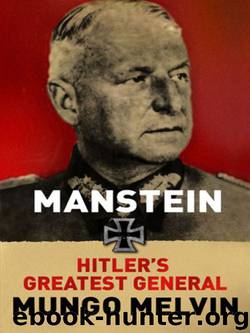Manstein: Hitler's Greatest General by Mungo Melvin

Author:Mungo Melvin [Melvin, Mungo]
Language: eng
Format: epub
Publisher: Orion
Published: 2010-04-17T21:00:00+00:00
Questions of Command and Manoeuvre
Manstein’s ability to realize his plan to hold, then defeat, the Soviet offensive between the Donets and the Dnepr rested on gaining the maximum freedom of manoeuvre from Hitler whilst at the same time preserving that for his subordinate formations. Much of the enduring benefit of Manstein’s Lost Victories, other than its intrinsic historical value, lies in his analysis of the challenges of operational command. Although the context, scale and scope of operations in contemporary conflicts are greatly different from those which Manstein directed, there is still considerable merit in reflecting on his writing today. Hence those responsible for the planning and conduct of major combat operations at large formation level (corps and echelons above) should have much to learn from his practical advice, borne from hard-fought experience.
Manstein maintained that the basis of his success in early 1943 lay in the adherence by army and army group commanders and staffs to two well-established German imperatives of command, namely: ‘conduct operations in a mobile and elastic manner’; and, secondly, ‘give commanders at all levels as much scope for initiative and independence as possible’. These long-established German principles, he stressed, were ‘greatly at variance with Hitler’s way of thinking’. Indeed, the Führer ‘repeatedly sought to meddle in the operations of subordinate headquarters by issuing specific orders of his own’.46 Perhaps for the benefit of members of the newly formed Bundeswehr as much for the general reader, Manstein elaborated on the second principle. He described what the British now term Mission Command (Auftragstaktik and Mission Orders in German and American usage respectively), building on his earlier remarks on the subject.47
It is worth quoting Manstein at some length in order to characterize the historical German art of command that he fought so hard to maintain during the war, although ultimately unsuccessfully because of Hitler’s outright opposition to such flexible methods:It has always been the particular forte of German command to grant wide scope to the independence of subordinate commanders - to allot them missions which leave the method of execution to the discretion of the commander concerned. From time immemorial - certainly since the days of Moltke the Elder - this principle has distinguished Germany’s military from that of other armies. The latter, far from giving the same latitude to subordinate commanders at the tactical and operational levels, have always tended to prescribe, by means of long and detailed instructions, the way orders should be carried out or to make tactical action conform to a specific template.48
Download
This site does not store any files on its server. We only index and link to content provided by other sites. Please contact the content providers to delete copyright contents if any and email us, we'll remove relevant links or contents immediately.
| Belgium | France |
| Germany | Great Britain |
| Greenland | Italy |
| Netherlands | Romania |
| Scandinavia |
Room 212 by Kate Stewart(5106)
The Crown by Robert Lacey(4810)
Endurance: Shackleton's Incredible Voyage by Alfred Lansing(4773)
The Iron Duke by The Iron Duke(4351)
The Rape of Nanking by Iris Chang(4206)
Joan of Arc by Mary Gordon(4104)
Killing England by Bill O'Reilly(3998)
Say Nothing by Patrick Radden Keefe(3976)
I'll Give You the Sun by Jandy Nelson(3431)
Shadow of Night by Deborah Harkness(3361)
Hitler's Monsters by Eric Kurlander(3331)
Mary, Queen of Scots, and the Murder of Lord Darnley by Alison Weir(3208)
Blood and Sand by Alex Von Tunzelmann(3199)
Eleanor & Park by Rainbow Rowell(3156)
Darkest Hour by Anthony McCarten(3121)
Margaret Thatcher: The Autobiography by Thatcher Margaret(3081)
Book of Life by Deborah Harkness(2935)
Red Famine: Stalin's War on Ukraine by Anne Applebaum(2930)
The One Memory of Flora Banks by Emily Barr(2857)
